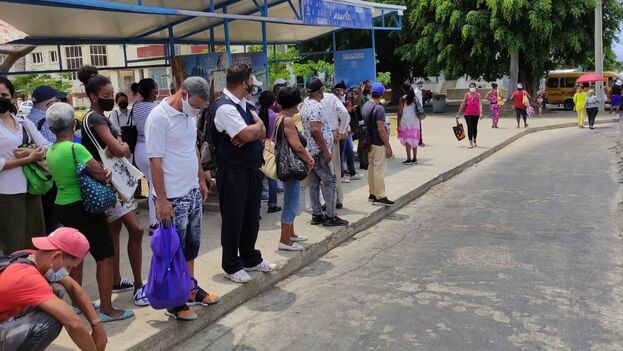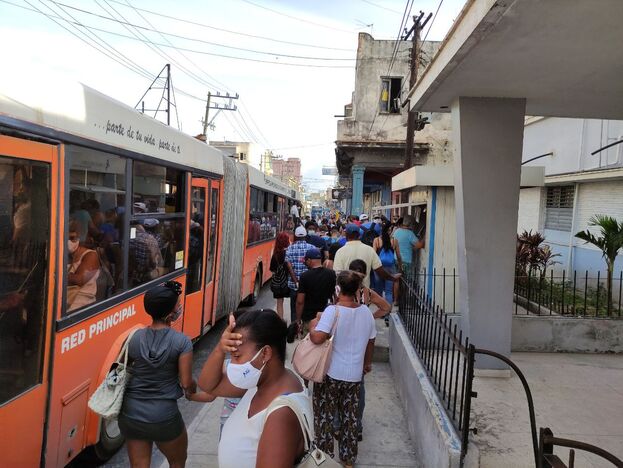
![]() 14ymedio, Juan Diego Rodríguez, Havana, 17 May 2021– Mondays are the most difficult days for public transport in Havana and today is proving especially difficult. Mobility in the Cuban capital has been reduced since May 17 due to the fuel deficit, a cut that has caused long lines at bus stops and widespread annoyance.
14ymedio, Juan Diego Rodríguez, Havana, 17 May 2021– Mondays are the most difficult days for public transport in Havana and today is proving especially difficult. Mobility in the Cuban capital has been reduced since May 17 due to the fuel deficit, a cut that has caused long lines at bus stops and widespread annoyance.
Along with the food supply, transportation is one of the main headaches for the residents of this city with more than two million inhabitants, where for decades moving from one place to another has been a problem, either due to lack of fuel, the deterioration of vehicles or, lately, the restrictions imposed by the pandemic.
“I went out to try to get to work but finally I had to call to say that I was not going to be able to come,” Luisa María, 65, a worker in a state canteen near the Capitol, explains to this newspaper. The employee resides in Alamar, a neighborhood in eastern Havana that has traditionally suffered from transportation deficiencies. Considered a dormitory city, Monday has been a particularly difficult day for the area.
“I work in a prioritized sector, because we cook for many old people who come for lunch in our dining room and have no other place to eat, but today two co-workers and myself, we have not been able to get there due to the transport issue,” explains Luisa María. “The other option was to take an almendrón*, but at this point in the month there is no money left for that.”
In the municipality of Diez de Octubre, the crowds at the stops were greater than days ago. “The driver of the private taxi in which I finally had to travel said that several customers he had picked up this morning were people who got frustrated waiting for the bus and in the end had to end up in private cars.”
“So it is very difficult to maintain the passenger limits that have been established during the pandemic,” complains the driver of Route 54, which goes from Old Havana to Lawton. “People do not understand, I tell them that they can’t get in because this is what we are ordered to do, but they prefer to take risks. I am a driver, not a police officer.”
Several of the people waiting at the stop, located on a narrow sidewalk and without shelter from the sun, were carrying heavy boxes or bags this morning. Through public transport, goods are moved from one municipality to another, at a time when basic products are scarce and the shortages force people to travel more to make purchases.

“My chicken will defrost if the bus does not arrive in the next hour,” laments a lady with a nylon bag in which she carries a package of frozen thighs. “I marked my place in line (at the store) last night and today I was one of the first to buy, because my sister who lives in this neighborhood told me, but now I’m between a rock and a hard place with the return transport.”
Since last January and with the rebound in covid-19 cases in the Cuban capital, the authorities decided to suspend public transport between 9 p.m. and 5 a.m. Vehicle capacity was also regulated: passengers can occupy all seats but the limit is up to 30 standing passengers in articulated buses, 20 in rigid buses and only 10 in smaller buses.
“People complain, but what is happening in other provinces is that all public transport is suspended; Havanans are still privileged,” says the companion of a cancer patient who has had to travel to the Cuban capital to continue treatment.
“In Cienfuegos, where we are from, they have suspended all transport from today. We were lucky to be able to leave on time and now we have been at this stop for more than an hour and we have not been able to get to El Vedado, which is where we have the consultation,” says the man from Cienfuegos waiting outside the Monaco cinema in Santo Suárez.
In Cienfuegos, which currently registers the highest number of infected people since the pandemic began, the authorities announced that as of this Monday “public transport is stopped, which includes travel between municipalities and alternative means of transportation such as motorcycle taxis, cars, pedicabs and rental ’machines’.”
Some believe that the restriction of transport in the capital, although motivated by the lack of fuel, may contribute to curbing new cases of Covid-1. “What they have to do is cancel all mobility and leave no routes in operation, only transportation vital to health and the economy,” says a passenger at the stop in front of Parque Maceo in Centro Habana.
However, these types of opinions are not well received by those who believe that a total shutdown of transport would aggravate the search for food, already complicated. “It is clear that you are not the person who cooks at your home, because if you were the one who must take care of looking for and preparing food, you would not think so,” replied a passenger to the proposal.
With the delay of the bus, for long minutes the stop became a small parliament with conflicting voices on the relevance of keeping public transport running. “And are they going to tell the bosses not to mark us tardy when we are late?” asked a young man who was trying to get to the municipality of Playa.
“My boss has the company car but I do not, I have to use public transport. You can see that this does not affect the ones at the top,” he lamented. “It seems like a joke because recently they told us that Japan had donated very modern buses but now there is no fuel to start them. When one thing is not missing, something else is missing.”
*Translator’s note: Almendrónes are privately operated fixed route taxis, with the service often provided by classic American cars; the name is derived from “almendra” — almond — and refers to the shape of these old cars.
____________
COLLABORATE WITH OUR WORK: The 14ymedio team is committed to practicing serious journalism that reflects Cuba’s reality in all its depth. Thank you for joining us on this long journey. We invite you to continue supporting us by becoming a member of 14ymedio now. Together we can continue transforming journalism in Cuba.
